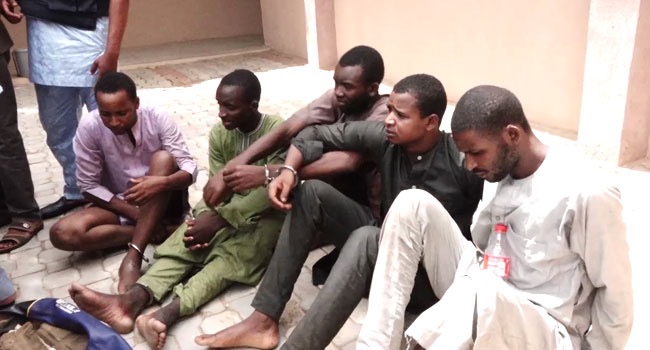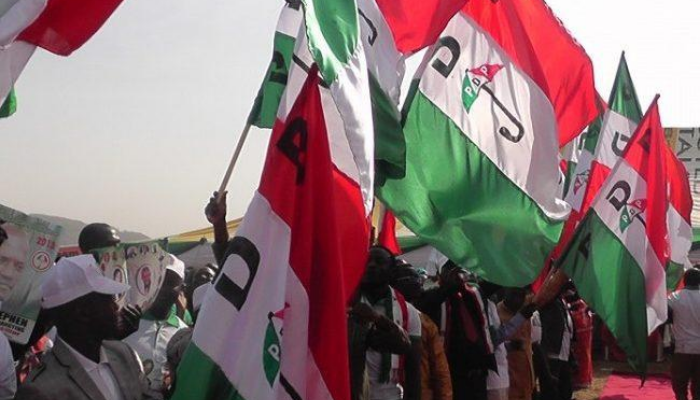Chidi Amuta
Stripped of predictable partisan blemish, recent revelations by Zamfara state governor ,Bello Mohammed Matawalle, provide some insight into key aspects of our current security nightmare.
For those who have been wondering how banditry emerged as a separate department of our crime industry, Mr. Matawalle’s has useful news. He comes from a vantage position as the governor of a state that has arguably become the national headquarters of a thriving banditry franchise.
To Nigeria’s anti intellectual national security establishment, therefore, I would recommend Zamfara as an unofficial insecurity laboratory and Matawalle as a credible source of useful statistical data and human intelligence. But in the search for credible solutions to the banditry problem, I wouldn’t touch Matawalle and his neighbor governors with a long pole.
First, a note of caution on the politician as source of intelligence. In a country an era where everything else is politicized, it can be hard separating politics from reality even in a matter as consequential as security of lives and limbs. Governors especially have tended to muddle up discourse on the prevailing insecurity with the politics of blame hunting and scape goat chasing. It is a deliberate ploy. Individual governors carefully choose convenient angles to address the insecurity in their states. The blame either goes to their political opponents for sponsoring criminals or the federal government for failing in its duties as the owner and controller of national security assets and agencies. Yet as the immediate prefects in the theatres of trouble, the public expects governors to be more factual and serious when it comes to security matters. This is one area where partisan fiction will not cut it. When it comes to who is looking out for their security and welfare, it is hard to fool the Nigerian public. We know who is playing political football and who is working for us. This is where Matawalle’s recent outing on the matter may at least help the security establishment.
Matawelle’s menu is a cascade of numbers. Over N900 million was paid as ransom to bandits in 8 years by the state government; that is a little over a N100 million a year in unbudgeted spend. There are over 30,000 bandits in about 100 different forest camps in the state and its neighbouring states. This comes to an average of 7 camps per local government and 2000 bandits in each of the 15 local government areas in the state. Over 300 weapons have been recovered from or surrendered by ‘repentant’ bandits in the state. Bandits killed 2,619 persons and kidnapped 1,190 persons between 2011 and 2019. Of the number kidnapped, 1000 were released without ransom. Another 100,000 people were displaced from their homes and livelihood. This does not take into account the farms destroyed, homes razed and food stores and other valuables lost to the rampaging banditry.
These statistics are further enriched by the recollections of immediate former governor Abdulazeez Yari. By his own recollection, 500 villages were sacked and devastated by the bandits with 13,000 hectares of farmland ravaged and destroyed. By his own estimates, the state haboured about 10,000 armed bandits and cattle rustlers during his tenure. Since 2010, the violence of bandits has left 44,000 children orphaned with 16,000 internally displaced persons in Anka local government area alone. By Yari’s unverified accounting, Zamfara state under his stewardship spent N17 billion in augmenting and supporting formal security efforts in the state.
Cumulatively, studies have shown that the state economy of pastoralism, animal husbandry and crop agriculture has declined by 50-55% as a result of bandit activity over the last ten years. Bandit terrorism has replaced agricultural products as the main export of Zamfara state to its immediate neighbours and the rest of the country. The state now ‘exports’ bandits and cattle rustlers of varying grades to neighbouring states and places as far afield as Abuja-Kaduna highway and parts of Nassarawa and even Benue states.
From this mishmash of figures, trends and features can be extrapolated to make sense of the extent and pattern of the bandit angle of Nigeria’s insecurity. First, both privileged accounts indicate that the bandit phenomenon has been developing over the last decade.
The first major harvest from the Zamfara experience is the danger posed by ungoverned spaces in our national insecurity. Ungoverned spaces refer to those stretches of territory in different parts of the country where the presence and influence of government is hardly in evidence. No security presence, neither police nor military or even vigilante presence. No federal, state or local government influence or presence. No functional social services except scattered schools and the occasional health centre.
Citizens in these spaces are left to the forces of nature; little education and enlightenment means a virtual state of nature in which ignorance and superstition hold the people mortal hostages. In the absence of constituted authority, they are at the mercy of self -appointed agents and enforcers of all hues. This is where bandits and all manner of armed agents fill the gaping vacancy left by government. They harass people, collect illegal taxes and tolls on one’s behalf and generally marshal whatever coercion they command to humiliate the people into blind and helpless obedience.
The great majority of our rural communities especially in the fringes of the North East and North West fall within this category. To citizens in these places, government is almost a fairy tale told by wayfarers from a distant place. The dominance of ungoverned spaces is greater in states with vast stretches of land and with a low level of urbanization and western education. Pastoral and subsistence crop agriculture is the mainstay of economic life and people live or die depending on the magnanimity of nature and benevolence of gods in the form of rainfall. Zamfara falls miserably within this sad category. Its population of 9.2 million lives mostly in rural far flung farming villages located very far from the state capital or indeed any other semi urban location.
Zamfara is made all the more attractive to bandit activity by the preponderance of forests. This is where the bandit camps are located and from where they operate freely. These forests include the Rugu, Kamara, Kunduma and Sububu. By the same token, Sambisa forest has become part of our national lore, being synonymous with the Boko Haram insurgency in the North East. It has provided a safe haven for insurgents and terrorists to train, organize and launch attacks from for over a decade. By the time the Nigerian authorities became aware of the existence and threat of the Sambisa fortress, it had become the nucleus of a virtual caliphate with helipads, ammunition dumps and secure supply routes. It was the nucleaus of an unchallenged unofficial sovereignty, collecting tolls and taxes from locals in exchange for a fierce justice that rewarded obedience or punished sabotage with instant death. It dug into the doctrinal weakness of the people to posit a more fanatical Islam that would take illiterate masses to heaven on a fast track.
Reports from different parts of the country indicate that forests have become safe havens for the operations of assorted criminal groups. Kidnappers and abductors take their victims into forest camps where they are held while ransom negotiations proceed by cell phones, far from the prying eyes of the police and state security operatives. Between 2005 and 2008, the forests in the border areas between Rivers and Abia states were the operational base of kidnappers operating in both states. Similar operations were mounted from the forests in the border areas between Rivers and Imo states off the Port Harcourt-Owerri highway.
It was the menace of these criminal activities that led the then Rivers state government to pioneer the acquisition of the technology for tracking suspicious cell phone calls from the Israelis. Detachments of the police were duly trained in the use of the new technologies. This led to the successful tracking of the criminals and the busting of their camps and cells in this area. This produced the welcome effect of reducing kidnapping in the axis at this stage.
Recently in Ondo state, for instance, the decision of governor Akeredolu to evict errant herdsmen from the state’s forest reserves led to a face off that spiraled into a north -south war of words, enveloping the entire South West. In Kaduna state, there is an ongoing war of nerves between governor El-Rufai’s government and bandits who abducted 39 students of the state forestry school and are still holding them in forests in the state. In cases where bandits and kidnap rings have entrenched their presence in these forests, the Nigerian military has had the unwholesome task of conducting sometimes indiscriminate aerial bombardments to smoke out criminal elements with predictable collateral human losses.
Ungoverned spaces are more dangerous strategically when they are located along borders between nations. For a long time in the Boko Haram operation, the border areas between Nigeria and its neighbours: Chad, Niger, Cameroun and even Benin Republic became the hotbeds of insurgent activity. This led to the birth of the multinational force with contingents from these countries to participate in ongoing enlarged counter insurgency operations.
In modern African history, ungoverned spaces along colonial boundaries have provided the base for the launch of major consequential rebellions that altered the history of major African nations either for good or for ill. By October 1992, Charles Taylor launched his assault on Monrovia from ungoverned spaces in two flanks: from the Liberia/Burkina Faso border and from the Liberia/Sierra Leone border area. The Liberian civil war was born and left the country bleeding and devastated until a multilateral effort led by Nigeria compelled a stalemate that eventually led to the defeat of Charles Taylor’s forces. Similarly, in former Zaire, Laurent Kabilla invaded Mobutu’s Kinshasha in 1997 to topple Mobutu from the bushes in the border area between Zaire and Rwanda. Yoweri Museveni’s forces came from the ungoverned border areas between Rwanda and Uganda to invade Milton Obote’s successor regime to Idi Amin’s infamy in Uganda in 1986 to initiate the Ugandan revolution.
In general, then, where ungoverned spaces have provided a launch base for movements informed by a definite political agenda, they have facilitated major political change in neighbouring territories. But where such spaces have provided a hiding place and safe haven for mindless and directionless criminality, they have become a source of insecurity and instability in the affected nation state. The latter is the case with Nigeria’s current situation.
It is also a historical truism that all guerila movements choose forests and ungoverned spaces to launch and sustain their activities, leaving the cities and highways to the conventional forces that tend to be the province of governments targeted by these guerilla movements. Nigeria’s current insecurity in its most armed iterations have followed this familiar path. Bandits, Boko Haram and sundry kidnappers have preferred the forests, leaving the highways and fancy cities to the army and the police.
The literal infestation of Zamfara with bandit groups has been made possible by a low level of government presence in the susceptible rural areas. There is a near lack of formal national security presence in most of the state. In the absence of sufficient military and police presence, a state with 9.2 million population in 15 local government areas now has over 30,000 active armed bandits in 100 camps. The scanty official security presence means that the rural populace owe their primary allegiance to local bandits and can at best rely on local vigilantes and traditional chiefs for their security. Study groups on Zamfara have identified corruption among traditional authorities and even vigilantes who sometimes collude with bandits to levy locals for farming activities in return for security. There have also been allegations of collusion between formal security agents and bandit gangs.
In such an environment, the decay of state structures for security can only aid a free circulation of small to light arms from porous borders adjoining the Maghreb. This is an area where arms from uprisings and sundry wars in Libya, Mali and Sudan have led to a thriving illegal arms trade across desert routes. The transportation of choice for these arms shipments tend to be camels and donkeys. Most importantly, a situation of abject poverty and material desperation can only breed a population that trades off collective security for paltry cash rewards. They give out information and security intelligence to whoever is ready to pay for it. Because the armed bandits tend to be the immediate reality that they can see and feel, people tend to withhold information on the activities of bandits from officials for fear of reprisals or in anticipation of rewards offered by bandits often at gunpoint.
Another major factor that has contributed to insecurity in Zamfara is the widespread activities of illegal miners for gold and other precious minerals. There would seem to be a modern day gold rush in the state with an influx of illegal foreign miners in rural Zamfara. These operations are facilitated by influential citizens, politicians and other powerful influencers. Because these illegal operations require security protection which is often not available from official quarters, bandit groups provide such protection for a fee. This is the classic natural resource curse in Africa which enthrones the triumph of anarchist forces in a vicious scramble for mineral resources that exist in places where the state is in dysfunction.
A state administration that is virtually dependent on on the magnanimity of bandit forces to exercise minimum authority or to be relevant to its citizens becomes a sitting duck which has little choice when it comes to facing up to the threat of bandits. This is the source of the option of negotiating with bandit leaders in exchange for the security to carry out the normal activities of government. Yet, this option which is being actively canvassed by governor Matawalle and some of his colleagues can only amount to a surrender of the authority of the state to criminals. This is the current dilemma confronting various levels of government in Nigeria in the face of armed insecurity. We are dealing with a situation in which the superiority of force which used to be the prerogative of the nation state is now being actively contested by non state actors. Should the state surrender to anarchy? Should it negotiate away part of its sovereign power? Or, should the state re-equip and reorganize in order to retake its authority by overwhelming force? These are the stark options which Nigeria now has to face up to as it battles the scourge of violent insecurity.
In some sense, then, Zamfara state with its low level of social and economic development and a predominantly agrarian and rural economy is a working laboratory for anyone who wants to understand, appreciate and fight Nigeria’s current scourge of insecurity.
Poor government presence is here. Ungoverned spaces in a state of nature are predominant here. The scourge of poverty and unimaginable inequality is here in abundant and overwhelming evidence. A free flow of arms and ammunition from the wombs of hell is here in free flow. Porous international borders have made guns more available than candies on the streets. Partisan divide and aggressive politics of winner take all is also everywhere in evidence. Most importantly, a natural resource curse that sacrifices order and security for uncontrolled access to limitless wealth from unregulated mining is wreaking havoc in this place as well.
Zamfara is something of a national treasure. It is a place that can teach Nigeria nearly everything about the sources of our current Hobbesian state.








